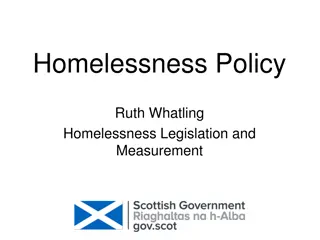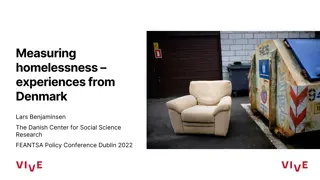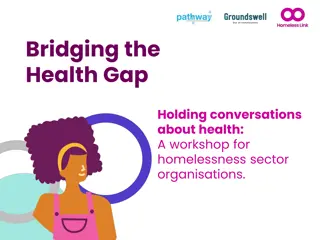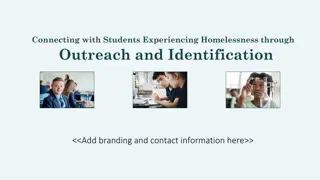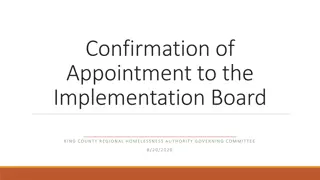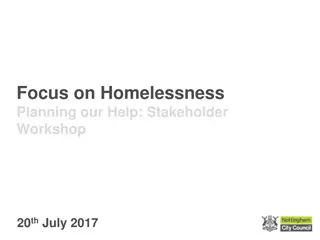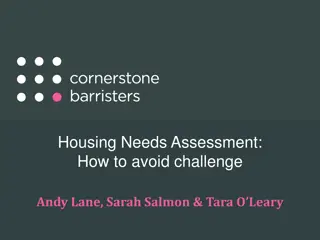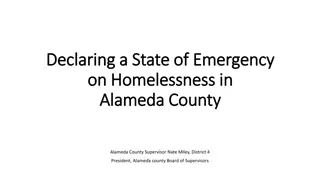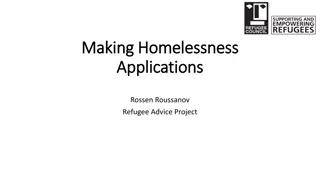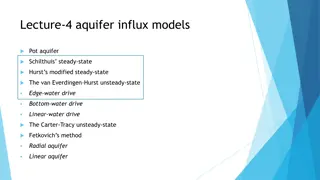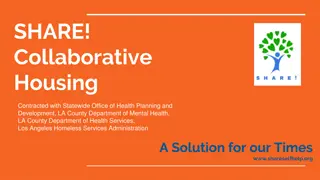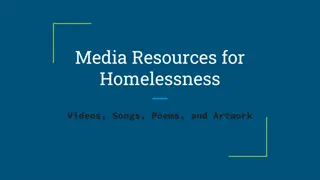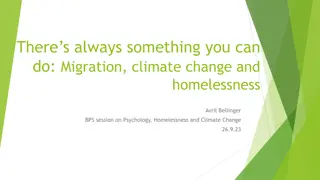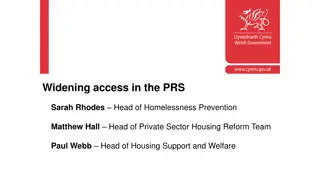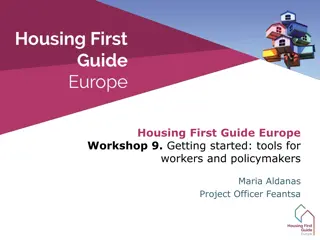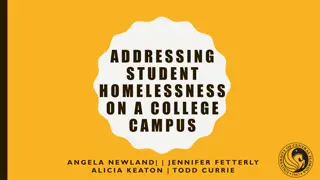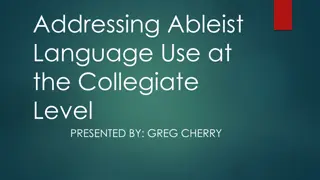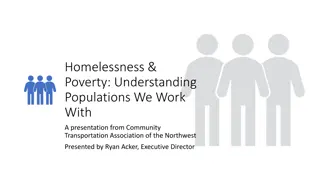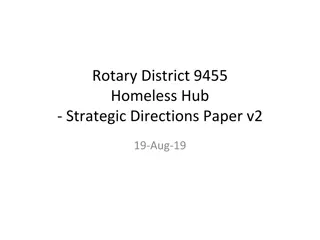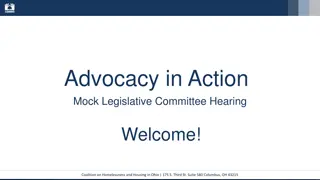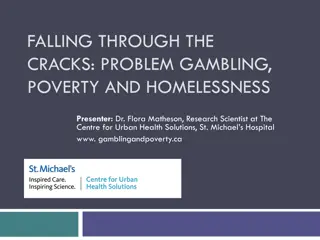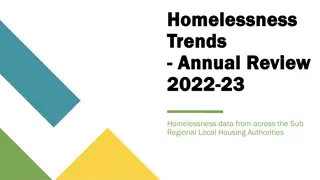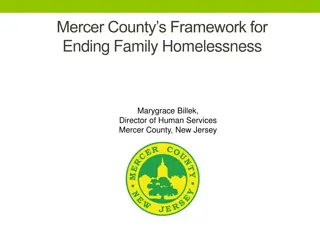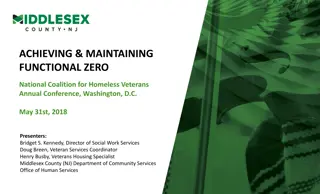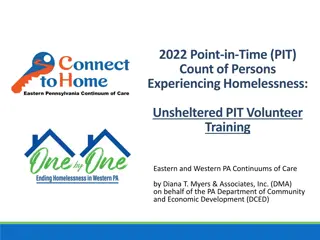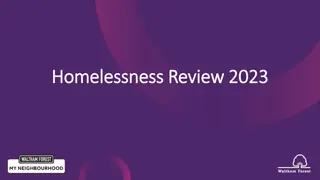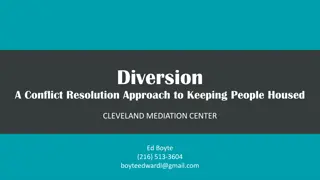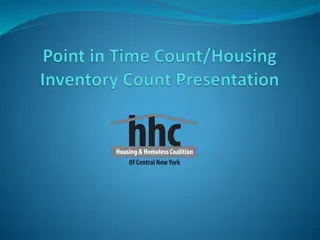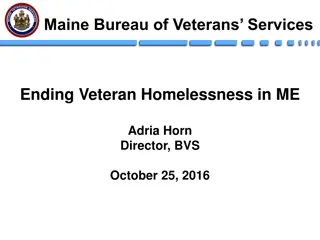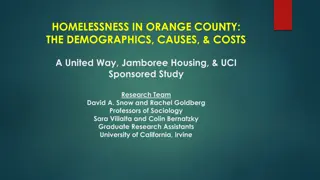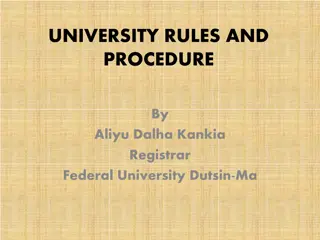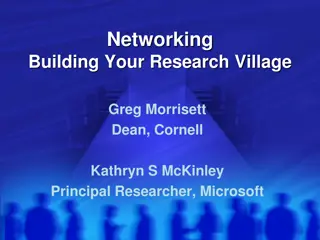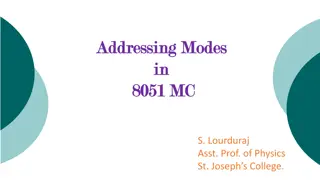Role of Universities in Addressing Homelessness: A Perspective by Greg Hurst
Exploring the crucial role universities can play in preventing and reducing homelessness through research, teaching, and fostering a better understanding of the issue. The article emphasizes the need for evidence-based approaches, person-first language, and challenging misconceptions surrounding homelessness.
Download Presentation

Please find below an Image/Link to download the presentation.
The content on the website is provided AS IS for your information and personal use only. It may not be sold, licensed, or shared on other websites without obtaining consent from the author. Download presentation by click this link. If you encounter any issues during the download, it is possible that the publisher has removed the file from their server.
E N D
Presentation Transcript
01 THE ROLE OF UNIVERSITIES IN ENDING HOMELESSNESS GREG HURST, HEAD OF COMMUNICATIONS & PUBLIC AFFAIRS
INTRODUCTION UNIVERSITIES AND HOMELESSNESS Definitions Ending: Homelessness should be prevented wherever possible and, where it cannot be prevented, it should be rare, brief and non-recurring Homelessness: Not just rough sleeping but all forms of homelessness, including sleeping in shelters or hostels, sofa surfing, living in temporary accommodation Language: Person-first language seeks to avoid stigma aor defining an individual by an experience of homelessness
INTRODUCTION UNIVERSITIES AND HOMELESSNESS Homelessness: Why universities? 1. The objects of a university 1. The role of universities as civic actors 1. Relationships with students 1. A new role for universities and homelessness
01 The objects of a university
OBJECTS OF A UNIVERSITY UNIVERSITIES AND HOMELESSNESS Research - We lack an evidence base of rigorous research into what works to relieve and prevent homelessness Some outstanding academics and excellent teams at UK universities are working to fill the gaps but we need more UK studies on homlessness tend to be qualitative and conceptual, showing a preoccupation with theoretical concerns In the US there is richer tradition of quantitative evaluation that can answer question: does this work? Universities can lead a cultural change to test what works in homelessness: evaluations including RCTs, systematic reviews, meta analyses - - - -
OBJECTS OF A UNIVERSITY UNIVERSITIES AND HOMELESSNESS Teaching - Homelessness faces more misconceptions and false narratives than almost any other area of public policy Curriculum content that refers to homelessness must be rigorously tested and evidence-based Be candid about what we don t know: causes of homelessness are well understood but many solutions have not been rigorously evaluated This is especially important in vocational courses whose graduates will deal with homelessness: medicine, social work, teaching, psychology How we portray homelessness can reinforce stereotypes: dehumanitising language and stigmatising images cause harm - - - -
01 Universities as civic actors
UNIVERSITIES AS CIVIC ACTORS UNIVERSITIES AND HOMELESSNESS Community engagement - Data suggests higher rates of homelessness in university towns and cities, driven by systemic factors such as higher local housing costs Universities are significant actors in their communities and have a civic duty beyond their objects to address local homelessness Support extra-curricular engagement by students and staff with charities, community organisations and services in homelessness Build connections with such groups to encourage students to gain experience and insights to inform and enrich their studies Raise awareness of the causes of homelessness and how it can be relieved and prevented based on best evidence - - - -
UNIVERSITIES AS CIVIC ACTORS UNIVERSITIES AND HOMELESSNESS The role of employer - Universities are often one of the largest employers in their city or town -often the biggest A quarter of people experiencing homelessness are employed (23%) and many more want to work Common barriers: poor health, drug / alcohol issues, low education attainment, lack of confidence, little work experience, criminal records Do recruitment practices exclude people people at risk of or experiencing homelessness eg past convictions, qualifications Testing and evaluating alternative models eg Individual Placement and Support: paid employment with bespoke in-work support - - - -
UNIVERSITIES AS CIVIC ACTORS UNIVERSITIES AND HOMELESSNESS Estates and property - Acting as a responsible residential landlord offering safe secure housing at affordable rates Testing models such as pre-tenancy training for tenants and evaluating these to strengthen the evidence base Being willing to rent to tenants with experiences of homelessness and / or in receipt of benefits Allocating a proportion of a university s estate to targeted initiatives to prevent and relieve homelessless Imaginative use of non-residential property or land to expand the supply of affordable housing / temporary accommodation - - - -
01 Universities and their student bodies
UNIVERSITIES AND STUDENTS UNIVERSITIES AND HOMELESSNESS Students and homelessness - Beware false narratives: not true that in the UK we re all one pay cheque away from homelessness, which is strongly associated with poverty But as universities face pressure to widen access, more young people from disadvantaged backgrounds enter higher education Admissions processes should not exclude applicants whose education and opportunities were disrupted by homelessness The collapse in enrollment of part-time and mature students in the past 12 years will have closed off pathways to applicants with experience of homelessness With a UK average drop-out rate of 5.3% -much higher in some institutions -do universities do enough to prevent homelessness among their students? - - - -
UNIVERSITIES AND STUDENTS UNIVERSITIES AND HOMELESSNESS Students welfare - Many universities act as landlord to their students, particularly in their 1st year, although private providers are becoming more dominant Since student numbers controls were dropped in 2015, did universities expand admissions faster than support and welfare services could cope? Mental health: universities were reluctant to take responsibility for mental wellbeing of students but lost the argument Universities invest considerable resources in tracking the employment status of their graduates for graduate earnings data Could more be done in a light-touch way to collect data on the housing status of current students and recent graduates to prevent homelessness? - - - -
01 A new model to end homelessness
A NEW MODEL TO END HOMELESSNESS UNIVERSITIES AND HOMELESSNESS Community action on homelessness - The Centre for Homelessness Impact is exploring a new model of non-statutory community-based action to address homelessness Creating and supporting a small number of experimental local coalitions to relieve and prevent homelessness Community groups, faith groups, grassroots charities, people with personal experience of homelessness, local businesses To engage with research evidence and data to maximise impact of voluntary action and experiment with new approaches Each area to partner with a university to extend civic impact and evaluate relative effectiveness of new ways of doing things - - - -
A NEW MODEL TO END HOMELESSNESS ADDITIONAL INFO/DATE/EVENT Join our movement Will your university join a community movement to end homelessness? Get in touch: greg@homelessnessimpact.org Sign our pledge: https://www.homelessnessimpact.org/end-it-with-evidence




